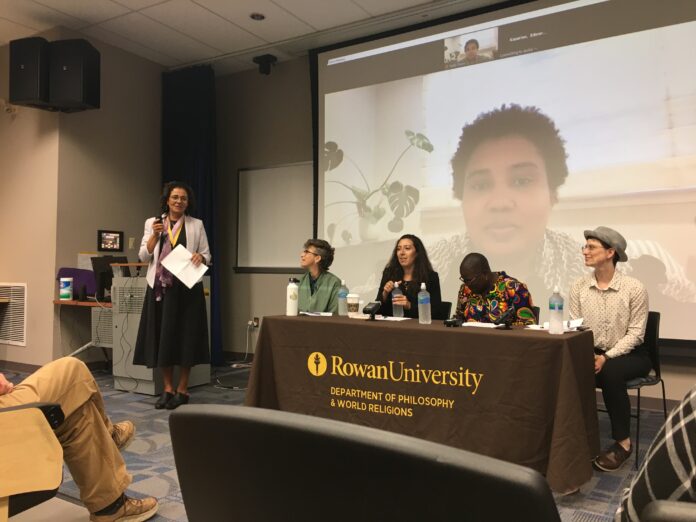
The Dobbs decision, the Supreme Court decree that overturned Roe v. Wade, was issued in June of last year and has ushered in a new world of legal, religious, economic, and philosophical discussion throughout the nation.
Due to the timeliness and relevance the issue of reproductive rights now has in the popular consciousness, the College of Humanities and Social Sciences and the Department of Philosophy and World Religions arranged the Reproductive Justice Panel, to explore a range of ways to think about the topic from religious, legal and philosophical points of view.
The panel was moderated by assistant professor of philosophy Eva Boodman, Ph.D., who also helped to organize the event.
“I’m really grateful that these experts and activists and scholars of reproductive justice could come and talk to the campus community on an issue that is very live… we think of abortion rights and we think of it as an isolated issue, but there’s a history to that issue and there’s a context. And it’s about much, much more so I’m really happy that students got to get a broader, bigger perspective and hopefully start to think about these issues in a new light,” said Boodman.
The panel guests included Lauren Barbato, executive director of progressive Catholic nonprofit Call To Action; Kimberly Mutcherson, a law professor at Rutgers University; Rabbi Abi Weber, assistant rabbi at Temple Beth Zion Beth Israel in Philadelphia; and Kelly Davis, an activist and former executive director of New Voices for Reproductive Justice.
One of the main themes of the panel was the difference between reproductive rights and reproductive justice. Mutcherson explained that while rights were a part of reproductive justice, the issue is broader than that. It includes the ability to choose how to have a child and under what conditions an individual will give birth, the ability to choose whether or not an individual has children at all, and the right to raise children in safe and healthy environments.
Rabbi Weber spoke of the distinction between the two categories by describing the way Judaism operates on a principle of obligation.
“I actually think that the things that you listed came about reproductive justice, really take it from the point of view of what is every individual’s right, to what are our obligations to one another as a society in order to build the kind of community, that kind of society that we want to build,” said Weber.
When the panel was asked how the nation ended up in its current situation in the way of reproductive justice, Barbato said that the overturning of Roe V Wade was a Catholic issue and goal for 50 years. She also emphasized that Catholics are overrepresented on the Supreme Court.
“American Catholicism, which was once the religious minority that has been persecuted, is becoming now like the victimized dominant, where they’re, you know, their frameworks are now law,” said Barbato.
The panel also discussed the uptick in maternal and infant mortality in the states that opted to ban or severely restrict abortion after Dobbs, the disparities in healthcare access and outcomes for marginalized groups, and student ObGyns no longer being trained in how to perform abortions in states where the procedure has been criminalized.
“It is a part of a much larger web that has to do about how we think of particular people, what we think of their bodies, and who gets to control those bodies,” said Mutcherson.
Davis spoke on issues of birth justice, specifically mentioning how some people are still made to give birth in prison and the lack of guaranteed paid leave for parents.
“We don’t have sick leave or parental leave… if you’re low income, you give birth, you’re back at work in like 10 days. And that’s even if you’ve had a C-section, even if you’ve had severe maternal morbidity,” said Davis.
When asked what the people in the room could do to advance reproductive justice, the panelists emphasized voting in every election, volunteering at practical support networks that provide the most up-to-date information on where to find reproductive care or access to abortion medication, becoming a clinic escort, and going to local council meetings and taking advantage of the public sessions to make their voices heard.
The topic of the panel did draw in a student crowd. One junior student, Morgan Murphy, found the panel informative and appreciated the perspectives provided.
“In order to actually have social change we have to make people realize that people’s lives are at risk… I feel like this panel was incredibly well-rounded and gave us a lot of perspectives that as a white woman I hadn’t considered… I’m white, I’m middle-class, I hadn’t considered or heard about intimately the challenges black women face and trans women face, and trans men even face as well surrounding this issue,” said Murphy.
For comments/questions about this story DM us on Instagram @thewhitatrowan or email the.whit.feature@gmail.com





